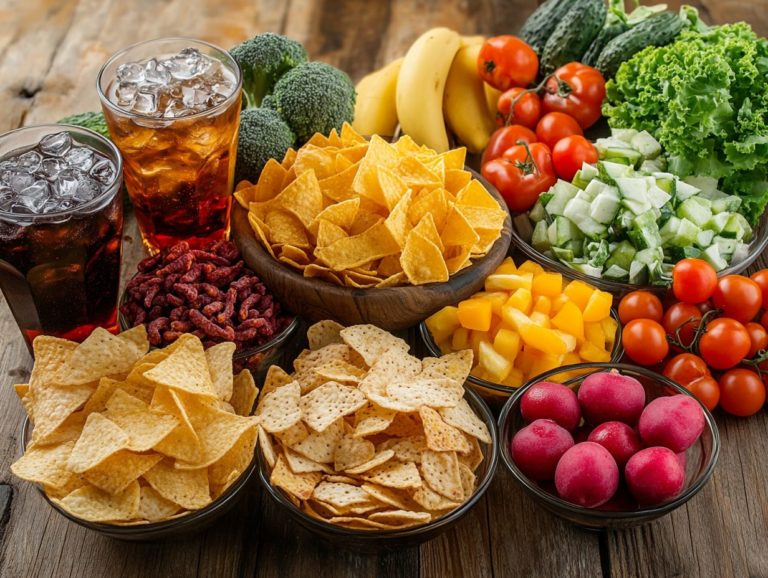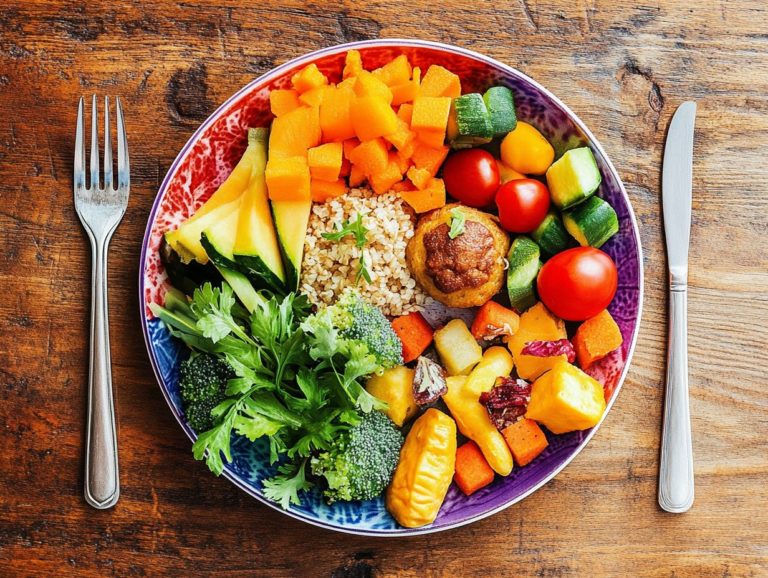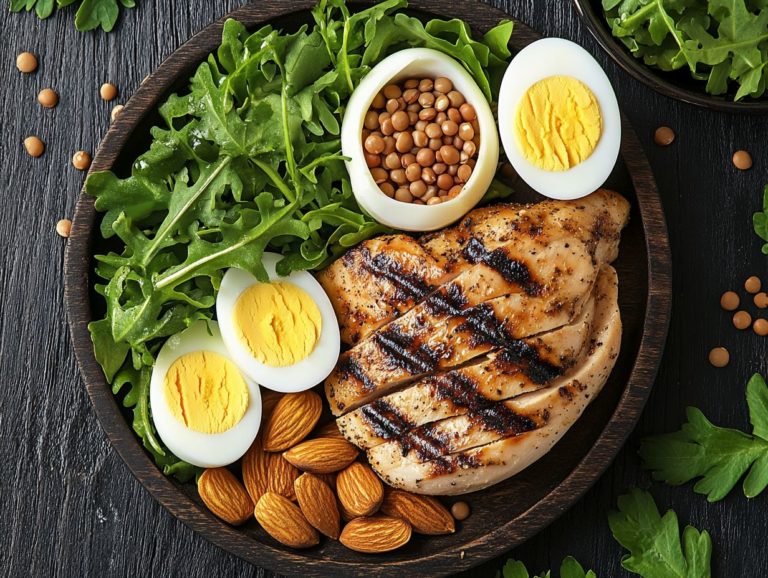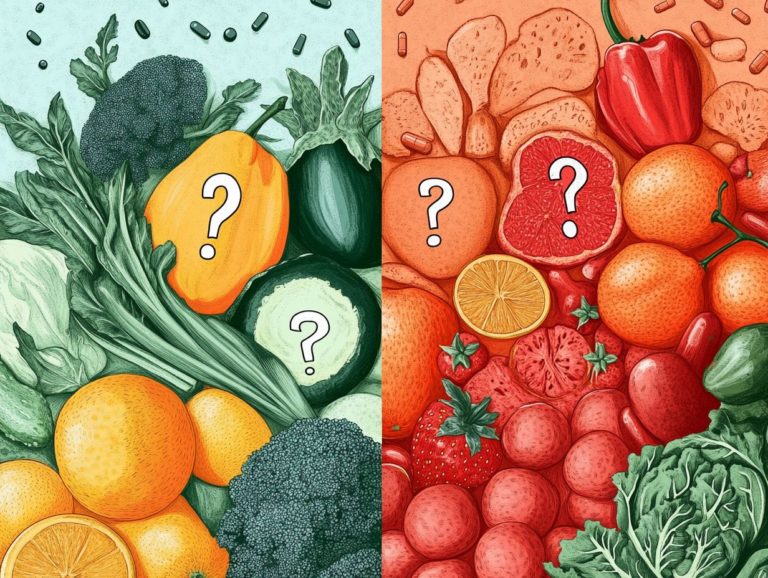Vegan Diets: Myths and Misconceptions
Curious about veganism? You re certainly not alone. A vegan diet, rooted in plant-based foods, is celebrated for its health benefits and ethical considerations.
However, myths and misconceptions can cloud your view. This article aims to clear the air, debunking misinformation while showing you the health advantages and challenges of veganism.
You ll discover practical tips for effective meal planning to meet your nutritional needs. Get ready to dive into the vibrant world of vegan eating!
Contents
Key Takeaways:
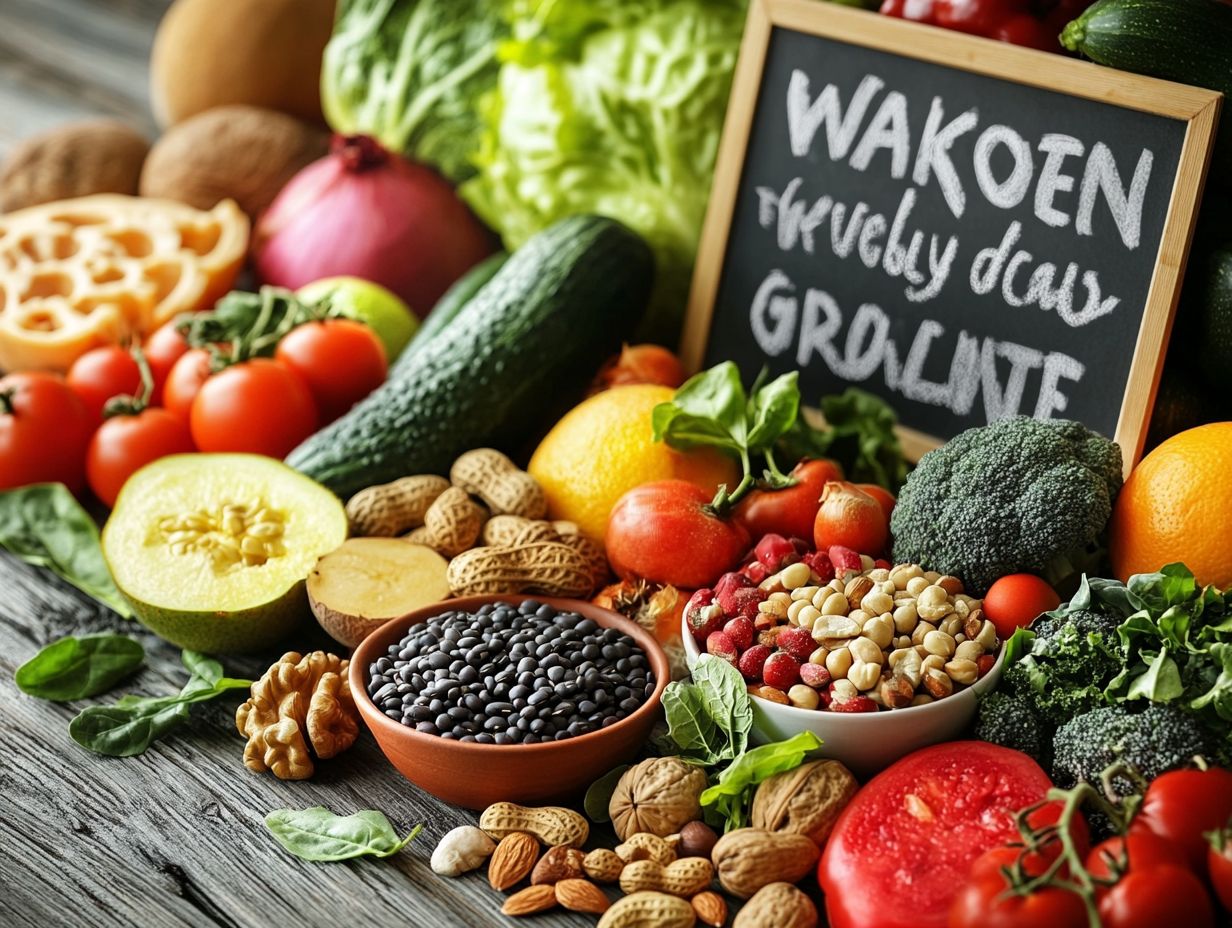
Vegan diets are plant-based and exclude all animal products. Misconceptions often stem from misinformation and can be debunked with facts.
Adopting a vegan diet can improve health, but social situations and nutrient deficiencies may present challenges.
What is a Vegan Diet?
A vegan diet excludes all animal products, including meat, dairy, and eggs. It emphasizes fruits, vegetables, grains, legumes, nuts, and seeds, providing essential nutrients and promoting ethical living.
As awareness of health benefits grows, many are embracing this lifestyle to enhance well-being, reduce their environmental impact, and address social justice issues.
Veganism began in the early 20th century, advocating for a life free from animal exploitation. When you adopt this diet, you can enjoy whole foods packed with plant-based proteins like lentils, chickpeas, quinoa, and tofu.
Dairy alternatives like almond milk, soy yogurt, and cashew cheese mimic textures and flavors you love without the health drawbacks of animal dairy.
Unlike vegetarian diets, veganism promotes total abstention from animal products. This commitment reflects a compassionate and sustainable way of living that aligns with ethical and ecological values.
Common Myths and Misconceptions
Despite the appeal of vegan diets, myths may hold you back. These misunderstandings often arise from a limited understanding of balanced vegan eating.
Concerns about missing essential nutrients can cloud your judgment. Let s clarify these misconceptions!
Debunking Misinformation
It s essential to debunk misinformation about vegan diets to understand their health benefits. Many believe it’s tough to get vitamin B12 without animal products.
In reality, various fortified foods and supplements can meet these needs without animal sources. Misconceptions about protein and calcium are also common.
Legumes, nuts, seeds, and greens provide ample protein, while fortified plant milks and green vegetables can deliver sufficient calcium.
Processed foods, when chosen wisely, can also add convenience and variety to your vegan diet without sacrificing nutrition. Addressing these myths encourages a shift towards plant-based living and promotes a healthier lifestyle.
Health Benefits of a Vegan Diet
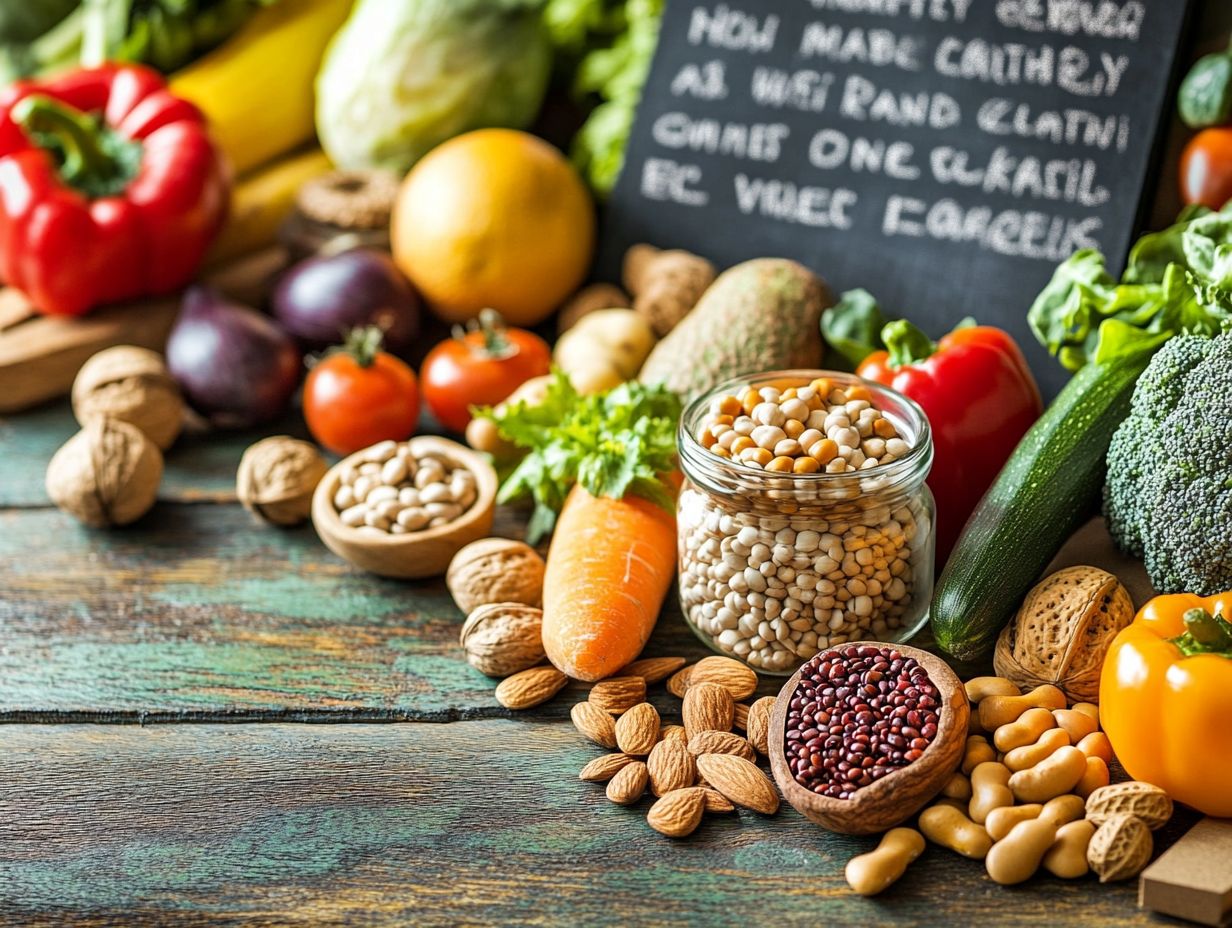
The health benefits of a vegan diet are truly extensive. It offers everything from enhanced heart health to a lower risk of chronic diseases, including certain types of cancer. This makes it an increasingly attractive option for many.
By prioritizing plant-based foods, a vegan diet delivers a rich array of dietary protein, essential nutrients, and dietary fiber. It also helps the environment.
By reducing the demand for animal agriculture, you contribute to lowering emissions associated with that industry. This choice is beneficial for both your health and the planet.
Improving Overall Health
Improving your overall health through a vegan diet requires a thoughtful choice to embrace a diverse range of whole, plant-based foods. It’s also essential to minimize processed items that could hinder your nutritional goals.
This approach boosts your physical health and your mental well-being while reflecting your ethical values.
By centering your meals around a vibrant assortment of fruits, vegetables, whole grains, legumes, nuts, and seeds, you can achieve a well-rounded intake of essential vitamins, minerals, and fiber. These natural foods are packed with antioxidants and natural compounds found in plants that are good for your health, which strengthen your immune system, support heart health, and reduce the risk of chronic diseases.
Choosing whole food sources over heavily processed alternatives allows you to sidestep added sugars, unhealthy fats, and excess sodium. This makes it easier to maintain a healthy weight and boost your energy levels.
This mindful eating practice not only fuels your body but also resonates deeply with your commitment to sustainability and animal welfare.
Addressing Nutritional Concerns
It’s crucial to tackle nutritional concerns for anyone considering a vegan diet. Potential deficiencies in calcium, B12, and certain proteins can pose health risks if not managed properly.
By familiarizing yourself with the best plant-based sources of calcium and the various options for obtaining B12, you can craft a well-rounded vegan diet that meets all your nutritional needs.
To ensure you re getting enough calcium, it s essential to incorporate a variety of foods, such as:
- Fortified plant milks
- Leafy greens like kale and bok choy
- Tofu made with calcium sulfate
Legumes and almonds are also great choices, providing essential nutrients to help fill any dietary gaps.
For protein, aim for a mix of:
- Quinoa
- Lentils
- Chickpeas
These foods not only pack a protein punch but also deliver essential amino acids. Don t overlook fortified nutritional yeast and supplements to tackle B12 concerns; they offer a convenient way to enhance your diet.
By thoughtfully selecting diverse food options, you can effectively support your health while reaping the rewards of a vegan lifestyle.
Challenges of a Vegan Diet
Adopting a vegan diet brings a wealth of health benefits, yet it also introduces certain challenges that you must skillfully navigate. This is especially true in social situations and when addressing potential nutrient deficiencies.
Successfully overcoming these hurdles demands thoughtful planning and a deep understanding of how to maintain a balanced diet amidst traditional food systems that often prioritize animal products.
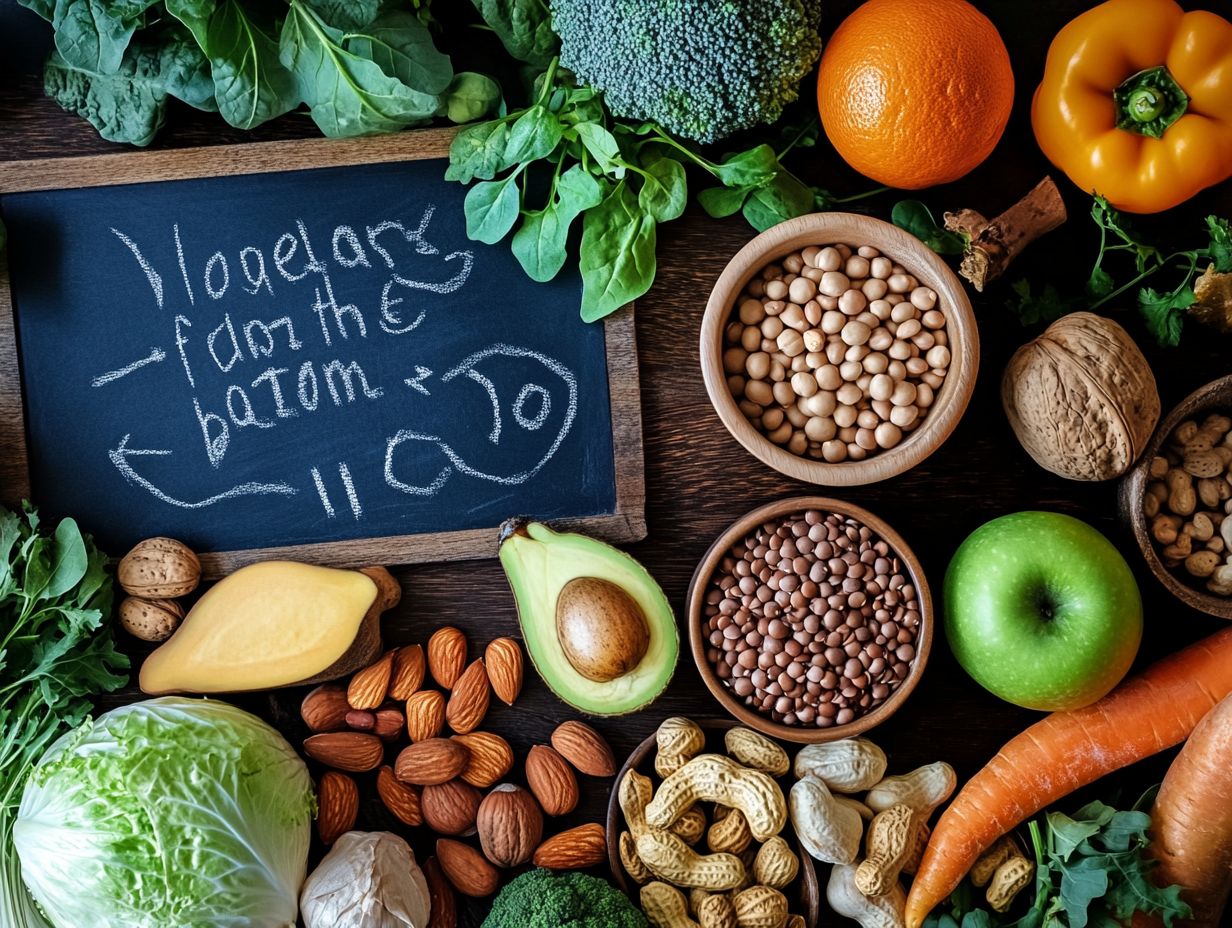
Navigating social situations can be one of the toughest challenges for anyone following a vegan diet, particularly in cultures where animal products are foundational to the cuisine. Ethical living significantly influences how you manage these interactions, requiring you to express your dietary choices thoughtfully and with confidence.
To ease any tension, consider opting for restaurants that offer vegan options or suggesting venues that are known for accommodating various dietary needs. Openly engaging with friends and family about your lifestyle can foster understanding and reduce awkward moments.
Having a few go-to conversation starters about ethical eating can help facilitate discussions, shedding light on the values behind your choices. Bringing a plant-based dish to gatherings not only showcases your culinary creativity but also reinforces your commitment to ethical food systems.
Start your vegan journey today and discover the incredible benefits for your health and our environment!
Managing Nutrient Deficiencies
Managing nutrient deficiencies is essential for maintaining health on a vegan diet. It’s particularly important to focus on crucial nutrients like protein, B12, and calcium.
Incorporating a variety of foods is key. Include legumes, grains, and fortified products to navigate potential deficiencies while enjoying a balanced and nutritious diet.
Strategic meal prep can ensure that these vital nutrients are consistently present in your daily meals. For example, batch-cooking lentils or chickpeas provides a hearty protein base for various dishes. Adding dark leafy greens like kale can significantly boost your calcium intake.
Exploring fortified plant milks and cereals helps maintain adequate B12 levels. You might also consider supplements; B12 tablets or nutritional yeast are convenient options to include in your routine.
By thoughtfully selecting a variety of nutrient-rich plant-based foods, you can create a well-rounded diet that meets your nutritional needs and supports your overall wellness.
Tips for a Successful Vegan Diet
Crafting a successful vegan diet requires careful meal planning. Focus on healthy foods rich in nutrients to elevate health benefits while providing variety and satisfaction.
By prioritizing whole, plant-based ingredients, you can ensure your nutritional needs are met while savoring the delightful flavors of a diverse diet.
Meal Planning and Nutrient-Rich Foods
Meal planning is your secret weapon for a thriving vegan diet. It guides you to incorporate nutrient-rich foods like legumes, grains, and a vibrant array of vegetables, all excellent sources of protein and calcium.
This thoughtful approach guarantees that each meal contributes positively to your health and well-being while keeping processed foods at bay.
Prioritizing meal prep optimizes your grocery shopping, helping you make informed choices that add a delightful variety of colors and textures to your plate. Embracing batch cooking saves time during hectic weeks, ensuring you can enjoy nutritious meals on your busiest days.
Diving into a world of diverse ingredients think quinoa, chickpeas, and seasonal produce ensures your nutrition remains uncompromised. Planning ahead with specific recipes helps you avoid last-minute, less healthy choices while igniting your culinary creativity and making cooking enjoyable.
Frequently Asked Questions
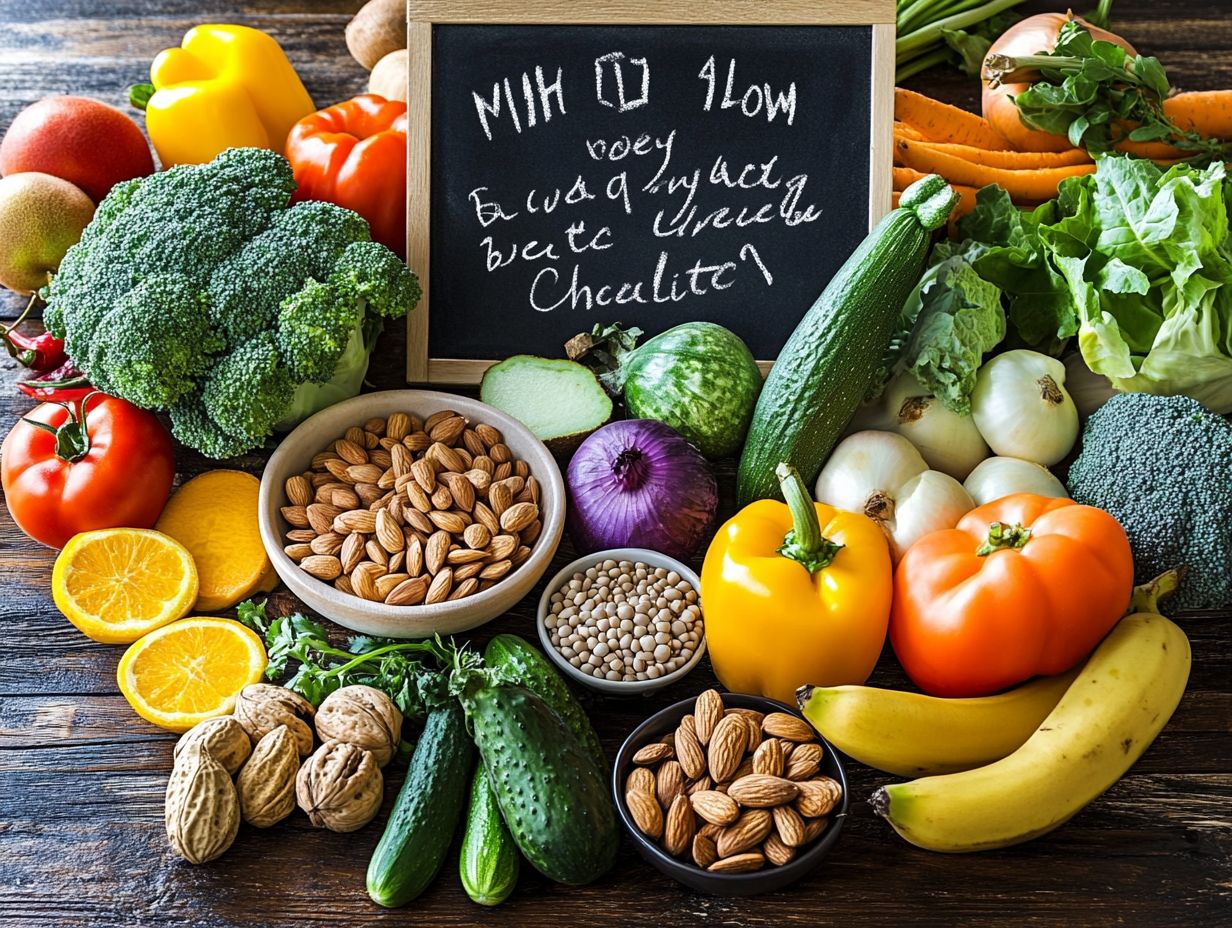
What are some common myths about vegan diets?
Some common myths include the belief that vegan diets lack essential nutrients, are more expensive, and are difficult to maintain.
Is it true that vegan diets are deficient in protein?
No, vegan diets can provide adequate protein through plant-based sources such as beans, lentils, tofu, and nuts.
Do all vegans have vitamin B12 deficiency?
Not necessarily. While vitamin B12 is primarily found in animal products, it can also be obtained through fortified foods and supplements.
Are vegan diets more expensive than non-vegan diets?
It depends on individual food choices. Plant-based staples like beans, grains, and vegetables can be cost-effective, but specialty vegan products may be more expensive.
Are vegan diets suitable for all stages of life?
Yes, with proper planning and a variety of nutrient-rich plant-based foods, vegan diets can meet the nutritional needs of individuals at all life stages, including children and pregnant women.
Can vegan diets provide enough calcium for strong bones?
Yes, many plant-based sources of calcium exist, such as leafy greens, tofu, almonds, and fortified non-dairy milk. You can enhance calcium absorption by consuming enough vitamin D and doing weight-bearing exercises.


